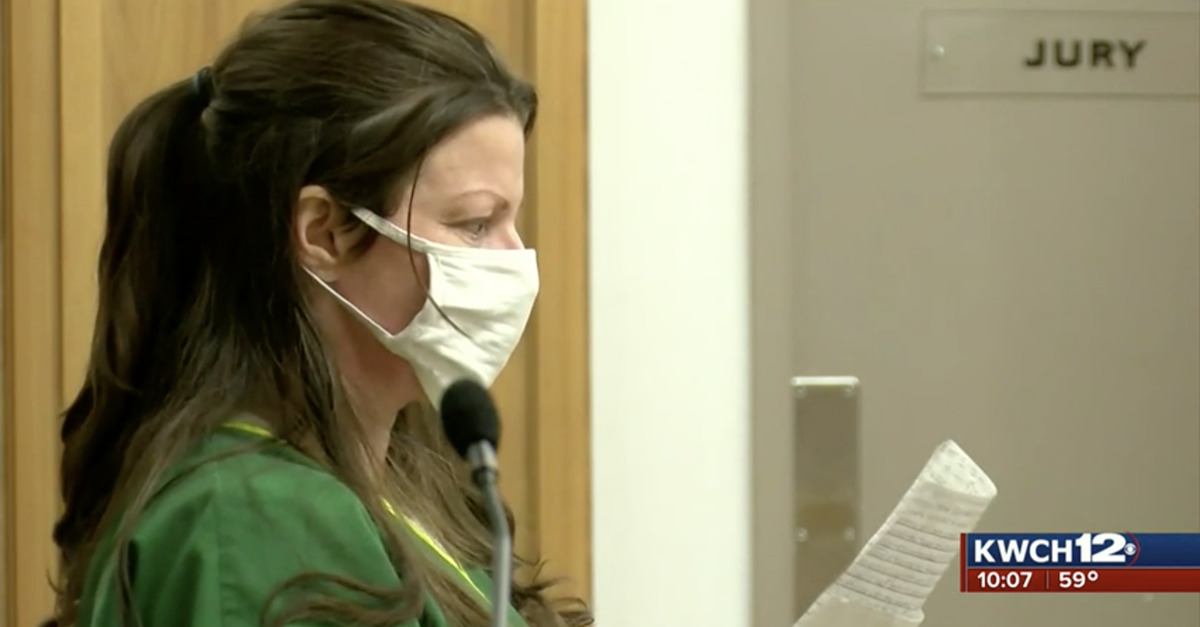
Rachael Hilyard apologizes to the family of the woman she killed and decapitated.
The Kansas Supreme Court on Friday affirmed the conviction and sentence of a woman who was found guilty of premeditated murder for decapitating a grandmother several years ago.
In February 2020, Rachael Hilyard, 40, was convicted of murder in the first degree by Sedgwick County jurors for killing her ex-boyfriend’s mother, 63-year-old Micki Davis, on April 9, 2017. In September of that year, she was sentenced to life without the possibility of parole.
“Hilyard appeals on several theories, including insufficient evidence to support premeditation, erroneous jury instruction, ineffective assistance of counsel, prosecutorial error, and the district court’s abuse of discretion,” the Sunflower State’s highest court wrote in their 27-page opinion. “[W]e affirm Hilyard’s conviction and sentence.”
As proven during trial and explained in the opinion, one of the deceased’s grandchildren was a witness who was instrumental in describing the events that led to the defendant’s conviction.
“Actually, he was the heart of the case,” Jeremy Rush said after the verdict was returned for the woman who killed his mother, referring to his now-11-year-old nephew, in comments reported by Wichita CBS affiliate KWCH. “He knew exactly what happened. He was a very smart and brave young man. Love him to death.”
The high court explains:
[T]hen 9-year-old J.G. accompanied his grandmother, Micki Davis, to the home of Rachael Hilyard, his dad’s ex-girlfriend. Davis had received a phone call from Hilyard to pick up J.G.’s dad’s things or Hilyard would leave them at the curb. While gathering those things at Hilyard’s home, Hilyard and Davis got into a fight. According to J.G., Hilyard suddenly pushed Davis from behind and began attacking her.
The boy then ran away and dialed 911.
While waiting for police to arrive, his grandmother was killed.
“Ultimately, the coroner ruled the cause of death was sharp force injuries through the neck,” the court noted. “The physical evidence found in Hilyard’s garage also suggested Davis was likely alive while being decapitated. Crime scene investigators found blood spatters at the scene which they believed had been caused by arterial spray—which generally requires an amount of blood pressure or a pumping heart.”
Hilyard was originally found incompetent to stand trial. After receiving treatment at Larned State Security Hospital, she was the subject of another evaluation. A district court eventually allowed the trial to proceed.
The now-convicted murderess testified in her own defense and did not dispute that she was responsible for Davis’ gory death. Her own defense attorney told jurors he expected they would find his client guilty of murder — but without premeditation.
The court recounts the way that strategy played out during trial:
Hilyard . . . testified she went to the garage “to go make sure [Davis] was okay still” . . . “‘cuz [Hilyard] thought [Davis] was gonna get back up.” Hilyard then began severing Davis’ head because “things” told Hilyard she had little time and she needed to get Davis’ head away from her body so her soul could get free and go to heaven. As Hilyard was cutting through Davis’ neck, the first knife broke. She had to stop and go get another knife from the kitchen. After severing Davis’ head, Hilyard walked into the kitchen and placed Davis’ head in the sink.
The heart of Hilyard’s appeal was that she was subject to a competency evaluation instead of a bona fide mental health examination before her trial. The Kansas Supreme Court dismissed that claim by noting the defendant “did not request a mental examination.” The high state court further said that state law “imposes no affirmative duty for courts to raise the issue of whether to order a mental examination.”
The Davis family issued a statement obtained by KWCH after the appeal was denied.
“Our family has received amazing news today!” the statement reads. “Micki’s homicide has finally come to an end, the convicted murderer has lost her appeal in the Kansas Supreme court! We can finally put this chapter to an end and remember Micki for the person she was and not how her life ended! #justiceformicki”
During her sentencing, Hilyard, eventually through tears, apologized to the Davis family.
“I will continue to pray for your forgiveness,” she said, reading from prepared remarks. “If I don’t get it, I deserve that, and I deserve all the time I’m going to get.”
The Kansas Supreme Court’s opinion can be read below:
[image via screengrab/KWCH]